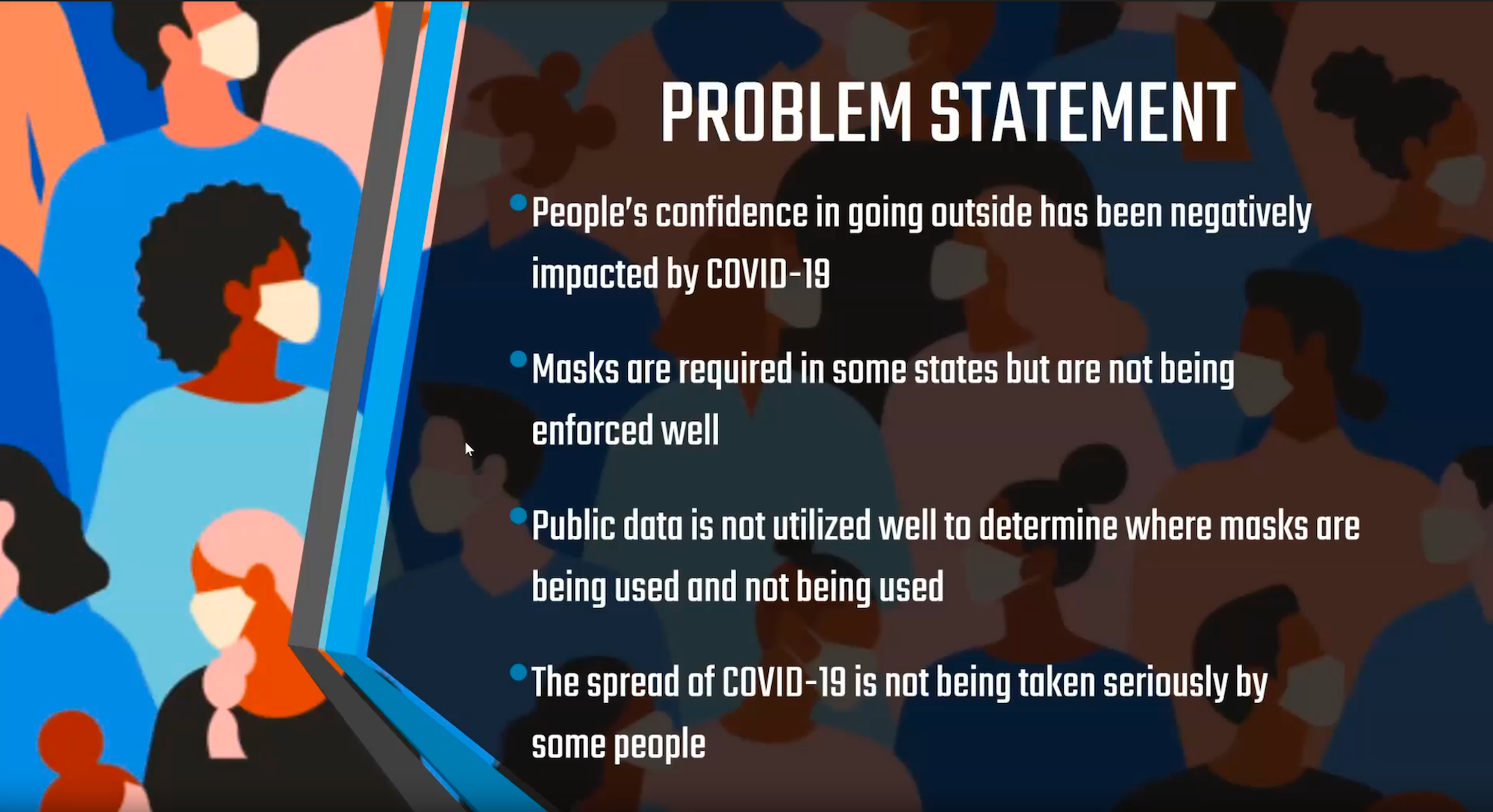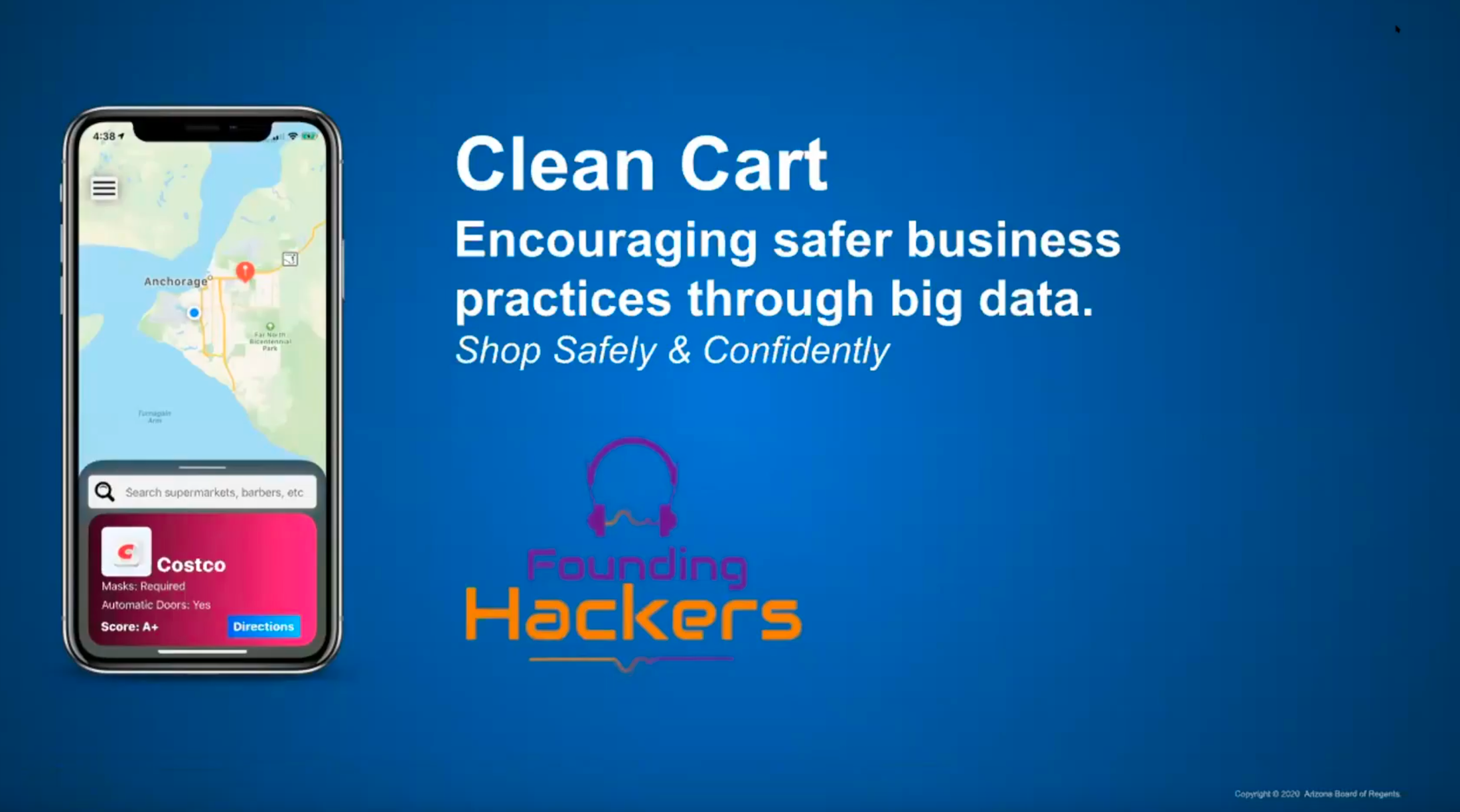Quest for invention: Data-driven ways to cope with COVID-19

Students competing in Arizona State University’s Devils Invent hackathons are tasked with formulating ideas for technology-based solutions to major societal problems. In the most recent competition, student teams focused on developing devices and systems to help communities reduce the spread of the COVID-19 pandemic. Image courtesy of the Devils Invent team BDJAZ/finder.com
Billions upon billions of bits of data — 2.5 quintillion bytes daily, to be exact — are produced by today’s vast array of robust information-gathering technologies, Chris Yoo told Arizona State University students competing in the most recent Devils Invent engineering design challenge.
Those who can mine that data and detect the patterns it reveals could help tackle some of the world’s most serious problems, Yoo said. Perhaps even the current COVID-19 pandemic.
Yoo is the CEO of Systems Imagination, which sponsored the June 26–28 Devils Invent Hackathon “Unleashing Data Against COVID.” It was the 18th Devils Invent event since the program began in 2016 and the second conducted virtually to comply with ASU’s social distancing practices in response to COVID-19.
Systems Imagination makes use of data science and artificial intelligence to rapidly identify “actionable insights,” as Yoo calls them, that help pharmaceutical companies better position their products to have positive impacts on public health. A sister company, Systems Oncology, has used System Imagination’s technology on massive data sets to develop more effective cancer therapeutics.
Eight hackathon teams comprised of approximately 70 engineering and science students, most from ASU’s Ira A. Fulton Schools of Engineering, were directed to emulate the companies’ business model and use publicly available data to devise ideas for how big data could help communities mount defenses against the continuing spread of COVID-19.
“Students are often able to bring fresh perspectives to wide open challenges like this,” Yoo said. “If you look at the history of invention and innovation you’ll see some of the most imaginative ideas come from younger people driven only by simple curiosity and who haven’t experienced being told what doesn’t work.”
Yoo’s hopeful expectations were borne out by the results of many of the hackathon teams’ efforts.
The Devils Invent team Apparently Coders came up with the Mass Tracker. The system consists of an app and a website to provide real-time information to help people avoid locations where crowds have gathered that may pose a higher risk of COVID-19 transmission. Image courtesy of the Apparently Coders team
Tech solutions for keeping people safe
Six teams advanced to present their solutions in the final round: Founding Hackers, BDJAZ, ViralHack, IMpossible, Apparently Coders and Novice.
Their ideas included information technology-based methods of enabling COVID-19 risk assessment so people can avoid places where infections are spiking and accessing data to help predict the next “hot spots” for the disease.
There were also concepts for developing technology to better predict and track the number of cases geographically and to provide visualization of information derived from that tracking.
Some ideas focused on designing technology that helps people understand their risks when they fail to heed public health guidelines and to inform them of best practices for protecting themselves. Other proposed devices would track the availability of hospital care in communities to aid people seeking prompt medical attention.
Teams motivated to make real-world contributions
The team Founding Hackers won third place and $500 for the Clean Cart, which encourages safer business practices and helps individuals determine in real-time where to shop confidently based on information about the levels of coronavirus outbreak in specific locations.
Team members were Curtiss Brouthers, a learning sciences graduate student in ASU’s Mary Lou Fulton Teachers College, biomedical engineering graduate student Patience Yeboah, computer science student Valarie Adams and Aaron Morse, who is studying engineering with a focus on robotics.
“Our application provides focused reviews of businesses, specifically essential businesses like grocery stores, and their compliance with Centers for Disease Control guidelines and enforcement so that customers can be informed about the risk level when shopping,” Brouthers said. “They could then comparison shop based upon distance and relative risk. This could help alleviate exposure to risk by reducing the amount of traffic between shopping locations.”
Brouthers says he and his teammates liked the challenge of dealing with “real-world, ‘wicked’ problems,” and were able to build on their skills with big data and data visualization, while getting more experience in brainstorming ideas, conceptualizing solutions, overcoming obstacles, prototyping, developing product pitches and coordinating teamwork. The team members are excited about entering future competitions together, he says.
Apparently Coders won second place and $750 for the Mass Tracker, which graphically provides geographical displays of areas where the COVID-19 risk is higher.
The team consisted of Fulton Schools computer science students Rheaa Sharma, Jannis Grimm and Vyom Desai, software engineering students Suhit Agarwal and Brenden Loftin, and Tapa Kar, an engineering graduate student focusing on robotics and autonomous and artificial intelligence systems. Agarwal is credited for coming up with the idea for team’s project.
“The problem we aimed to solve came from my personal experience,” Sharma said. “My family and I went out to get groceries, but the store was too crowded, which forced us to go in search of another store. This proved to be time-consuming and inefficient. We realized that if we had known the store was crowded, we would have visited another store.”
Sharma describes the team’s product as an app and a website that predicts the risk of contracting the coronavirus at a specific location based on parameters such as the number of active COVID-19 cases in the area, population density and the total population of a county.
“Our product also includes features that help you decide if you should get tested for COVID-19,” Sharma said.
Her team’s Devils Invent experience was “incredible,” she said. “We loved the competitive spirit and we were amazed by some of the other teams’ ideas.”
Students learn to first clearly define the problems their Devils Invent projects are attempting to solve. In this image, the BDJAZ project team details reasons for increases in COVID-19 infections. Those factors were used to develop the concept for the Mask Finder system, designed to show whether most people in specific locations are wearing or not wearing protective face masks that prevent exposure to COVID-19. Image courtesy of the Devils Invent team BDJAZ
Fast-spreading disease gave relevance to students’ project
The first-place prize of $1,000 went to the BDJAZ team for a working prototype called Mask Finder that analyzes publicly available image data to determine where the spread of COVID-19 may be higher based on people's use of face masks in those locales.
The product is a mask-recognition artificial intelligence device that determines the percentage of people wearing masks in a specific location by using public or local businesses’ surveillance cameras, said BDJAZ member Andrew Deros, who is pursuing a degree in mechanical engineering in the Fulton Schools and an industrial design degree in ASU’s Herberger Institute for Design and the Arts.
Along with Deros, the team included mechanical engineering students Bill Nguyen, Daniel Kim, Jaime Gutierrez and Zachary Sanchez.
“The problem we were addressing is people’s concern about the usage of masks in their area. There just isn’t a good way to determine that sort of information currently” Deros said. “However, with Mask Finder, businesses can begin to rebuild confidence in their customers and help people feel more comfortable going outside.”
This was the sixth Devils Invent event for Deros, who says he finds it exhilarating to “work with new people and come up with new and exciting ideas to some very relevant problems. We get to build teamwork skills just as much as technical skills.”
He says participating in a virtual Devils Invent — using Discord, an instant messaging and voice-over internet protocol application — made it possible “to hang out with friends similar to the way I would play video games online, which made the experience more fun.”
The Clean Cart project developed by the Devils Invent team Founding Hacking gives consumers metrics to determine if essential businesses in their communities are adequately following health and safety guidelines to protect customers from transmission of COVID-19. Image courtesy of the Founding Hackers team.
Unleashing young talent on meaningful endeavors
The winners of the virtual competition “demonstrated a level of determination not often seen in our in-person events,” said Anthony Kuhn, the Devils Invent director and a lecturer on the Fulton Schools faculty.
“The winning teams in this event showed that determination in some of the clearest ways possible. I saw them constantly online, plugging away on their Discord channels,” Kuhn said.
“Many of these students have not dealt with data analysis in such a real way before,” Kuhn said. “The majority came in with little to no experience in this particular subject, but they buckled down, and with the help of Systems Imagination’s mentors were able to learn quickly.”
Nico DeBruyn, a marketing manager and intern manager for Systems Imagination, with a degree in nutrition and dietetics from ASU, was one of the mentors for the event, as well as a judge. He says Devils Invent is showcasing the entrepreneurial spirit among ASU students.
“This is like both a sprint and a marathon for them. They’re spending a lot of hours on this day and night,” DeBruyn said. “So, it tests their patience and their willpower, but they stay intense from beginning to end.”
Systems Imagination CEO Yoo sees Devils Invent as “a perfect showcase of ASU’s focus on innovation,” and a space in which students are encouraged to think outside the norm while at the same time learning how to pursue practical solutions.
“Startup companies like ours can bring valuable, real-world experiences and techniques to students in a way that can unleash the talent and inventiveness of these motivated young minds,” Yoo said. “I think this event inspired students to do something meaningful to address the COVID-19 pandemic when it can seem like we are powerless to do so.”
More Science and technology

ASU professor breeds new tomato variety, the 'Desert Dew'
In an era defined by climate volatility and resource scarcity, researchers are developing crops that can survive — and thrive —…

Science meets play: ASU researcher makes developmental science hands-on for families
On a Friday morning at the Edna Vihel Arts Center in Tempe, toddlers dip paint brushes into bright colors, decorating paper…

ASU water polo player defends the goal — and our data
Marie Rudasics is the last line of defense.Six players advance across the pool with a single objective in mind: making sure that…



